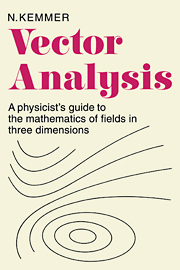Book contents
- Frontmatter
- Contents
- Dedication
- Preface
- Introduction
- 1 Summary of vector algebra
- Exercises A
- 2 The geometrical background to vector analysis
- 3 Metric properties of Euclidean space
- Exercises B
- 4 Scalar and vector fields
- Exercises C
- 5 Spatial integrals of fields
- 6 Further spatial integrals
- Exercises D
- 7 Differentiation of fields. Part 1: the gradient
- 8 Differentiation of fields. Part 2: the curl
- 9 Differentiation of fields. Part 3: the divergence
- 10 Generalisation of the three principal theorems and some remarks on notation
- Exercises E
- 11 Boundary behaviour of fields
- Exercises F
- 12 Differentiation and integration of products of fields
- 13 Second derivatives of vector fields; elements of potential theory
- Exercises G
- 14 Orthogonal curvilinear coordinates
- Exercises H
- 15 Time-dependent fields
- Exercises I
- Answers and comments
- Index
15 - Time-dependent fields
Published online by Cambridge University Press: 23 December 2009
- Frontmatter
- Contents
- Dedication
- Preface
- Introduction
- 1 Summary of vector algebra
- Exercises A
- 2 The geometrical background to vector analysis
- 3 Metric properties of Euclidean space
- Exercises B
- 4 Scalar and vector fields
- Exercises C
- 5 Spatial integrals of fields
- 6 Further spatial integrals
- Exercises D
- 7 Differentiation of fields. Part 1: the gradient
- 8 Differentiation of fields. Part 2: the curl
- 9 Differentiation of fields. Part 3: the divergence
- 10 Generalisation of the three principal theorems and some remarks on notation
- Exercises E
- 11 Boundary behaviour of fields
- Exercises F
- 12 Differentiation and integration of products of fields
- 13 Second derivatives of vector fields; elements of potential theory
- Exercises G
- 14 Orthogonal curvilinear coordinates
- Exercises H
- 15 Time-dependent fields
- Exercises I
- Answers and comments
- Index
Summary
Throughout this book so far we have talked about fields as functions of position only. In most physical applications of this theory the fields are also functions of time. To physicists fields are dynamical things that both experience and effect interactions with other systems, so the study of their development in time is of great importance.
As the time dependence of any physical quantity is usually governed by some basic dynamical law and the laws are different in different branches of physics, it might be thought that the ideas of vector analysis would be too general and all embracing to have anything to say about the time dependence of fields. To some extent this is true and we cannot here go far into dynamical problems. But there are two aspects of time dependence that can be very profitably discussed as aspects of vector analysis. It is fitting to conclude any study with a chapter on these topics, particularly because they provide an excellent illustration of how our general ideas can actually be used in a real physical context.
In this chapter we shall talk of scalar and vector fields ø(t, r) and f(t, r) and, in addition to the differentiation symbolised by ▽, we shall frequently form derivatives of the fields with respect to time: ∂ø/∂t and ∂f/∂t. We assume that differentiation with respect to time does not alter the vector character of a field: like ø itself, ∂ø/∂t is a scalar and, like f, ∂f/∂t is a vector.
- Type
- Chapter
- Information
- Vector AnalysisA Physicist's Guide to the Mathematics of Fields in Three Dimensions, pp. 181 - 190Publisher: Cambridge University PressPrint publication year: 1977



